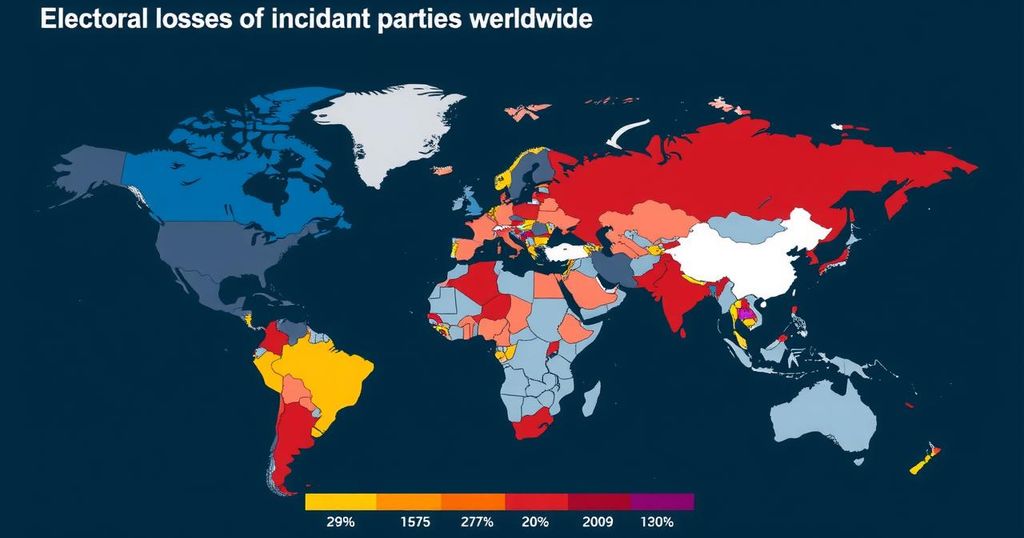Global Trends in Electoral Losses: The Democratic Party amid Incumbent Defeats
In a global trend, incumbent parties, including the Democrats in the U.S., have suffered significant electoral losses. This discontent mirrors a broader phenomenon in democracies worldwide, where economic challenges and voter frustration following the pandemic played a crucial role. Despite weathering the storm better than many, Democrats may view future elections more favorably as they transition to an opposition role.
In the aftermath of the recent elections, a significant trend has emerged globally whereby incumbent parties are facing substantial losses, which is not unique to the Democrats in the United States. As Vice President Kamala Harris’s campaign is scrutinized for its effectiveness, it is crucial to contextualize her defeat within a broader international landscape. The data reveals that in a multitude of democracies, over 80 percent of incumbent parties experienced declines in either vote share or parliamentary seats. Countries such as Japan, South Africa, and Botswana have recently witnessed historic losses by long-standing ruling parties, with some forced to relinquish power. Notably, in Senegal, opposition candidate Bassirou Diomaye Faye achieved a historic first-round victory in the presidential election, marking a significant shift in political dynamics. Additionally, Sri Lanka also saw a pivotal change as the opposition secured a sweeping victory just two years after widespread protests against the incumbent government. Across Europe, 14 nations reflected a similar disaffection toward their sitting governments. In contrast, Democrats appeared to fare better than many incumbents, suffering only minor losses in comparison to those seen in other wealthier democracies. The United States displayed a somewhat resilient electoral performance, with preliminary indications suggesting limited losses in Congress and potential gains in the House of Representatives. One factor contributing to the relatively modest defeat for Democrats may stem from the United States’ economic performance, which, while not without its challenges, has reportedly outperformed many other nations. While inflation and housing costs are prime concerns for voters, metrics indicating growth in GDP and improvements in real wages also exist. However, these positive indicators were largely overshadowed by prevailing economic anxieties among the American populace. Comparatively, other nations that retained their ruling parties did so by addressing pressing security concerns, including issues related to violence and foreign threats. Unfortunately, national security did not dominate the United States electoral discourse in the same manner, potentially hindering the Democrats’ campaign effectiveness. Ultimately, the election outcomes suggest that the United States is not exempt from the global wave of voter dissatisfaction, which has systematically challenged incumbents post-pandemic. While Democrats faced considerable challenges, the potential shift to a non-incumbent status in future elections presents a more favorable outlook for their electoral prospects.
The recent election cycle has been marked by a notable global trend in which incumbent parties are experiencing unprecedented losses across various democracies. This phenomenon is sparked by widespread voter discontent, particularly in the wake of the COVID-19 pandemic, which has exacerbated economic challenges and led to growing dissatisfaction with government performance.
In conclusion, the recent electoral defeats for many incumbent parties around the world illustrate a significant shift in the political landscape, driven predominantly by voter frustration and economic concerns. While Democrats performed better than some global counterparts, they were still not immune to the overarching trends of discontentment that have swept through numerous democracies. Moving forward, Democrats may find renewed opportunities as they shift from incumbency to the opposition in the next electoral cycle.
Original Source: abcnews.go.com




Post Comment